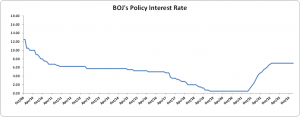December 28, 2023
The Monetary Policy Committee (MPC) of the Bank of Jamaica (BOJ) has unanimously agreed to maintain the policy interest rate at 7%, preserve tight Jamaican dollar liquidity conditions, and ensure relative stability in the foreign exchange market. The MPC’s decision was based on the positive trends in the key drivers of headline inflation, fairly stable core inflation and the expectation that the impact of the public passenger vehicle (PPV) fare increase will be temporary.
Jamaica’s annual headline inflation rate was 6.3% in November 2023, above the 5.1% in October but lower than the peak rate of 11.8% in April 2022. Core inflation, excluding food and fuel, was 5.6%, consistent with the last three months average and lower than the 8.4% in April 2022, indicating that core inflation is being contained. Inflation is projected to continue to rise above the Bank’s target range for much of the period between the December 2023 and March 2025 quarters, primarily due to the continued impact of the increases in selected PPV fares.
The primary drivers of headline inflation, such as international commodity prices and shipping costs, continued to fall with some commodity prices trending below the Bank’s forecast, and the exchange rate has remained generally stable, due to monetary policy actions and strong tourism and remittance inflows. Average grain prices are expected to remain below projections over the near term. Inflation in the economies of Jamaica’s main trading partners has also continued to decline. Deposit dollarisation, which reflects the proportion of United States (US) dollar deposits to total deposits, continued downward to its lowest level since December 2011.
The risks that inflation could surpass expectations have increased. These include second-round effects from the PPV fare increases, sharper-than-anticipated increases in domestic agricultural price inflation over the near term, and higher-than-projected future wage adjustments in the context of the tight domestic labour market. A deterioration in supply chain conditions could also influence higher inflation. The downside risks to the inflation outlook include oil and grain prices trending well below forecasts and weaker-than-expected global growth, which could have a stronger-than-projected downward pull on domestic demand and imported inflation, resulting in lower price changes.
Future monetary policy decisions will depend on incoming data related to these risks. The MPC will continue closely monitoring core inflation and prospective inflation concerns. Should new inflation risks arise, the Committee is ready to take the appropriate steps, such as tightening monetary policy even more.

Disclaimer:
Analyst Certification – The views expressed in this research report accurately reflect the personal views of Mayberry Investments Limited Research Department about those issuer(s) or securities as at the date of this report. Each research analyst (s) also certify that no part of their compensation was, is, or will be, directly or indirectly, related to the specific recommendation(s) or view(s) expressed by that research analyst in this research report.
Company Disclosure – The information contained herein has been obtained from sources believed to be reliable, however its accuracy and completeness cannot be guaranteed. You are hereby notified that any disclosure, copying, distribution or taking any action in reliance on the contents of this information is strictly prohibited and may be unlawful. Mayberry may effect transactions or have positions in securities mentioned herein. In addition, employees of Mayberry may have positions and effect transactions in the securities mentioned herein.
